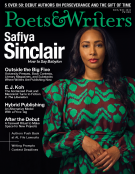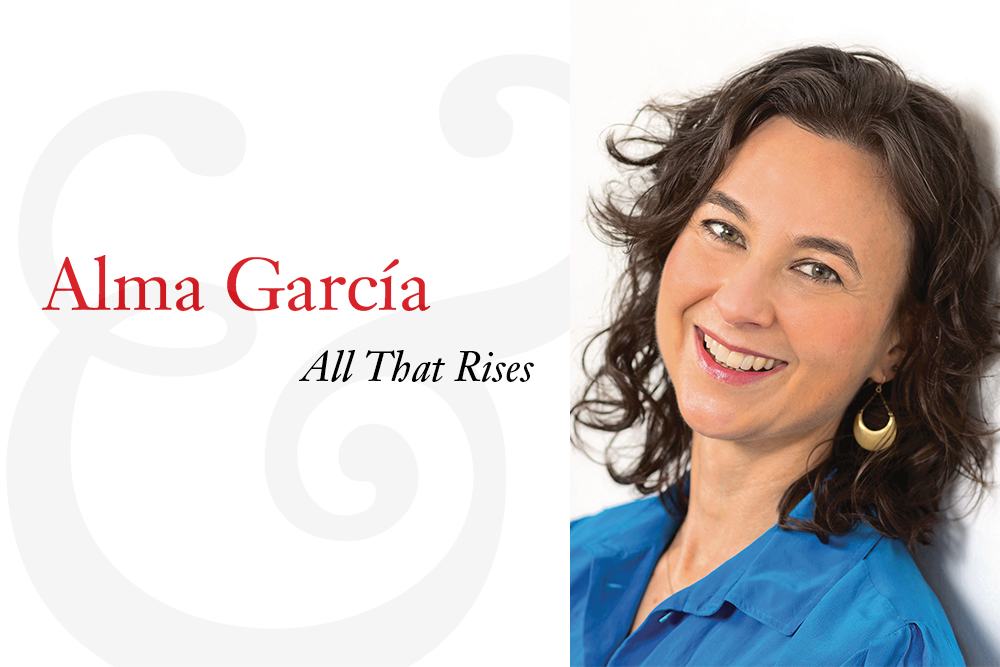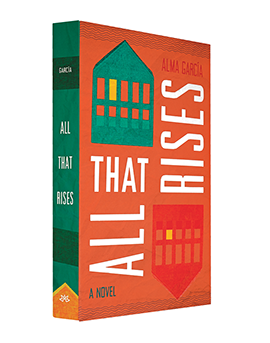Dear writer, the despair of a dream that will seemingly never be realized is real,” writes Alma García in her essay for our eighth annual celebration of debut authors over fifty who have recently published their first books. The essays that follow encompass tales of fate—both encouragements and setbacks—as well as stories of commitment, hope, nerve, confrontation, transformation, triumph, travel, revision, luck, self-confidence, and, of course, writing, always back to the practice of writing, which is necessary to pursue one’s work over the years, come what may. These first-time authors, who range from their early fifties to early seventies, remind us that time, and its inevitable passage, is a gift that enriches our personal and literary lives and that age can make us both robust and nimble, ready to persevere, to put words on the page.
Alma García, author of All That Rises (University of Arizona Press)
Bernardine “Dine” Watson, author of Transplant (Washington Writers’ Publishing House)
Tommy Archuleta, author of Susto (Center for Literary Publishing)
Chin-Sun Lee, author of Upcountry (Unnamed Press)
Donna Spruijt-Metz, author of General Release From the Beginning of the World (Parlor Press)
![]()
Alma García
Age: 52. Residence: Seattle. Book: All That Rises (University of Arizona Press, October 2023), a novel exploring the entanglement of two neighboring families in El Paso, Texas, revealing unexpected alliances and the permeability of presumedly fixed boundaries as the cast of characters search for where they belong in the confluence of history, border politics, their homes, and the outside world. Agent: Stuart Bernstein. Editor: Rigoberto González.
I am one of those people who was pretty much born a writer. I wrote my first story in kindergarten. By high school I’d cemented my reputation as that girl who writes, and exactly no one was surprised when I went on to double major in creative writing and journalism in college. I planned to have a first novel written—and published, naturally!—by the age of twenty-five.
When that age came and went I acknowledged I was a bit behind. It was understandable. I was working full-time as a journalist, which was a sure recipe for mental exhaustion, and so eventually I made a leap of faith, left my job, and entered an MFA program. By my program’s end my first story was published. With great energy I began to assemble a story collection. As my collection neared completion, close to seven years in the making, I landed my agent in a fairy-tale scenario, when—prompted by one of his clients, whom I’d never met but who had read my work—he contacted me and asked if I had a book in the hopper. Did I ever.
The book was not ready, my agent very kindly informed me. The book really needed to be a novel. Deep in the pit of my intuition, I knew he was right. Slowly, painfully, I started over.
By this time I was married. A cross-country move followed soon after, then motherhood, and a serious back injury. I could only manage a trickle of writing, instead of a torrent, through those years, but I was always creeping through my novel’s draft. Until, at long last, it was done.
When the book went out on submission to the Big Five, it was rejected. Roundly. Everywhere. What followed over the next three years was a revision so massive, I eliminated a whole book’s worth of material. It went out on a second round of submissions. Hope again inflated my heart.
Crickets. Did publishers find the novel’s border setting and culture too unfamiliar? I wondered. Did they struggle with characters who unapologetically spoke English and untranslated Spanish in the same breath? Was it too political? Not political enough? Or was it just…me?
Dear writer, the despair of a dream that will seemingly never be realized is real. So is the embarrassment you feel (oh, who are we kidding: It’s humiliation) when some of the people in your life say, “You’re still working on that thing?” So, too, is the obstinate, hubristic, instinctual understanding that—even if you haven’t yet found the key that will unlock it—there is still something worthwhile about your story.
Sometimes hope will unfurl its tendrils the moment you let go of it. A year or so into a new writing project, when my agent called with the astonishing news that the University of Arizona Press wanted to publish my novel, we both erupted with joy. The series editor, Rigoberto González, understood the book. On its own terms. Completely.
Writing a book over a very long time is sometimes a deadly enterprise. Ideas drift. The end point disappears. A lack of urgency can overtake you. You might find yourself appalled when you pass your own characters in age. You become aware of your own mortality, of the soul-sucking thought that your best creative years already might be behind you.
But if you listen quietly, sometimes you’ll hear the truth of your own creative being whispering in your ear. The truth is, no matter my proclivities or achievements or intentions, I didn’t have the ability to write my novel until I wrote it—three times, over the course of almost two decades. The truth is, the writing leads you back to yourself and to the knowledge of who you have become because of it. The writing leads you to what never could have been written without your life experiences and to what you can offer those who are coming up behind you, for you are wiser now than you once were.
When you come to the end of something, dear writer, whether or not it’s how you hoped it might end, no matter your age when you arrive, you know what you have? A beginning—one that’s as mysterious and wild and wide-open as you want it to be.
Author photo: Meryl Schenker Photography. Book photo: David Hamsley.









